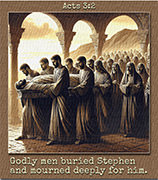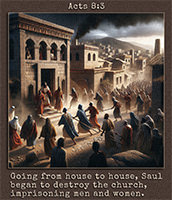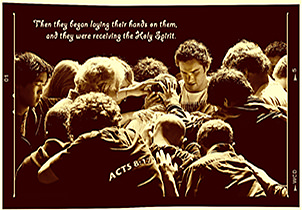
Acts 8:1–25 . . .
“The Scattered Church and Simon the Sorcerer”

Click the image to see how today’s passage focuses on the
“Martyrdom of Stephen and the Birth of Persecution”
Something unusual happens in ten short verses starting with Acts 7:59. The story turns quickly from Stephen’s horrific death by stoning to other believers in Christ being scattered and “preach[ing] the word,” leading to these amazing words, “There was great joy in that city” (8:8). That’s the paradox of persecution.
From persecution to great joy, just like in the early church, when “great persecution broke out” (8:1), “those who had been scattered preached the word wherever they went” (v. 4). There was “great joy” in Samaria (v. 8). When forces in our world stand against the truths and teachings of Scripture — especially the gospel — that’s not the time to give up.
Clearly, God moves in powerful ways when the church faces such difficulties. Indeed, God has the power to turn persecution into something precious.
[Note: Find and read today’s Scripture near the bottom of this page.]
Acts 8–12 shows us how the early Jesus community becomes an international movement.
Philip in Samaria | Sorcerer Simon | Philip and the Ethiopian (ch. 8)
Saul’s Conversion | Saul in Damascus and Jerusalem (ch. 9)
Cornelius Calls for Peter | Peter’s Vision | In Cornelius’ House (ch. 10)
Peter Explains His Actions | The Church in Antioch (ch. 11)
Peter’s Miraculous Escape From Prison | Herod’s Death (ch. 12)
› Watch BibleProject’s superb animated video (2 min.) that highlights Luke’s account of the growing multi-ethnic Church.
During our earlier weeks’ studies we saw that God has already used Peter to proclaim Jesus as the Messiah to crowds of people in Jerusalem, as well as to the Jewish Sanhedrin, the highest religious and civil court in Judaism. In our previous study (See Warren's summary of Acts 7:51–60), we learned how God also used Stephen to preach in Greek-speaking synagogues, which led to his arrest and trial before the Sanhedrin; instead of defending himself, he indicted his accusers, showing their charges of him to be inconsistent with Old Testament teaching, and their resistance to God’s Spirit to be entirely consistent with Israel’s rebellion against God and his prophets and other appointed servants.
Our last lesson ended with Stephen's stoning. Now in Acts 8, Luke starts by documenting great persecution and scattering of the church, going on to describe the spread of the gospel following his death. In today's text, God will employ several unlikely individuals to promote the preaching of the gospel. Who God uses and how he uses them will prove instructive and encouraging to us. Let's listen to God’s Spirit as he speaks to us through this great text, which is broken into three elements: (1) The church scatters as Paul persecutes many; (2) Philip preaches to people in Samaria; and (3) Simon the sorcerer believes.
The Church Scatters as Paul Persecutes Many (8:1–3)
The murder of Stephen by a mob of Jewish leaders was a great blow to the church. It must have felt that it couldn’t afford to lose a man of his caliber. As a leader, he exemplified being filled with the Spirit; as an evangelist, he possessed a boldness and eloquence that few could match. Luke’s brief note that “Godly men buried Stephen and mourned deeply for him” (v. 2) opens a window on the courage, love, and theology of the early church in the face of persecution. Placed between Saul’s violence and the scattering of the church, v. 2 shows that persecution can’t erase the church’s capacity for mutual care.
The loss of Stephen was bad enough. But that was only the beginning of the church's trouble. Those Jewish leaders who stoned Stephen next turned their wrath against the entire church in Jerusalem. The one person spearheading the persecution was Saul, the same young man who held the cloaks of Stephen's slayers (8:58). Saul conducted a house-to-house search for believers, throwing those he found into jail. Fear of imprisonment and death drove many believers out of the city. Although the Twelve remained in Jerusalem, persecuted refugees scattered themselves throughout the region.
Stephen's execution caused a "great persecution" to break out "against the church in Jerusalem" (v. 1). His death was only the beginning. The floodgates of persecution had been opened against the Christians in Jerusalem and beyond. The church was therefore forced to do what it had been reluctant to do — to preach the gospel to the surrounding regions. In 1:8, Jesus clearly told his followers to look beyond Jerusalem and take and present the gospel message to Judea, Samaria, and the whole world. But to this point, Jesus' followers hadn't yet done that.
Was this persecution of new Christians the will of God? God can and will use pressing circumstances to guide us into his will. When everything's fine, we may never consider taking a certain course; but when a crisis occurs, it can open our eyes to that course. Sometimes we have to be shaken out of our comfortable state before we'll do what God wants us to. And sometimes we scatter. Scattering's end result was the glorification of God because that church's persecution enabled its believers to spread the message far and wide. We shouldn't think that those who left Jerusalem left as "formal preachers." Most were "apprentice missionaries" who talked personally about Jesus wherever they went.
Philip Preaches to Those in Samaria (vv. 4–8)
Surprisingly, it was to the Samaritans that Philip the Jew brought Jesus’ gospel. Like Stephen, Philip was one of the men chosen to serve the church family in practical ways when the dispute regarding Hellenist widows arose (6:5). He was also one of those forced to flee persecution (v. 1), ending up in Samaria. After the Jews had rejected the gospel [yet again], we see God extending Jesus' offer of salvation to other peoples, beginning with the Samaritans who, six hundred years earlier, had been conquered by the Assyrians. The wealthy and middle-class Jews from the area were deported. Then, a pagan population from afar moved in, intermarrying with the lowest classes of remaining Jews in northern Israel; from these people came the Samaritans.
Jews hated Samaritans, considering them compromised half-breeds who corrupted the worship of the true God. Because Philip wasn't a racist towards the Samaritans, and because Jesus had touched him personally, there couldn't be room in his heart for such prejudice. He preached Christ to them by presenting the gospel with signs and wonders that followed, which became an impressive confirmation: For when the people found Jesus, "there was great joy in that city." Undoubtedly, one reason there was such joy was that Jesus had sown the seed in Samaria during his ministry (John 4:1–26), and Philip was indeed reaping that harvest.
Simon the Sorcerer Believes (vv. 9–25)
Of the many "Simons" in the New Testament, Simon the sorcerer had a fair degree of local fame. Honored as one who didn't only have the power of God, they said of him that "This man is rightly called the Great Power of God." Remember this: Sorcery in the Bible always has a connection with the occult and with drug taking. Whatever real power Simon might have had, it was derived from Satan, not God. The specific Greek wording indicates that Simon was a magus, one of many magi. In the ancient world, there was a class of astronomers and scientists known as magi (Matthew 2:1), but local wizards and sorcerers also took that title, using it to prey on the ignorance and superstitions of common people.
Sadly, the Samaritans wrongly assumed that, because Simon had real spiritual power, such power came from God. That simply wasn't the case. Apostle Philip (enlarge image) clearly had a significant effect on Simon the sorcerer who became convinced by Philip's preaching and amazing miracles, to the point where he declared his belief, was baptized, and continually associated with Philip, becoming a follower of Philip and his ministry. At a minimum, Philip’s Christ‑centered preaching and Spirit‑given miracles broke Simon’s spiritual monopoly in Samaria and forced him to reckon seriously with the superior power of the risen Christ. So you might say: Philip’s ministry genuinely unsettled and redirected Simon
The Samaritans receive the Holy Spirit (vv. 14–17) Jesus had given unto Peter (and the other apostles) the keys of the kingdom of heaven (Matt. 16:19). It was for that same purpose that Peter and John here officially welcomed the Samaritans who'd previously been excluded from becoming people of God entitled to be a part of his kingdom. Obviously, there was a subsequent experience with the Holy Spirit that these Samaritan believers didn't sense until the apostles came and ministered to them. Often, the empowering and filling of the Holy Spirit is received when hands are laid on a person, and prayer is offered for them (Acts 9:17; 1 Timothy 4:14; 2 Tim. 1:6). We should always be ready to receive and utilize those special graces and gifts that God has given us. May we often make a hearty effort to lay our hands on those needing to be filled with Jesus' Spirit and requisite prayer.
Note: The laying on of hands is a humble, physical sign that sets a person apart to receive what only Christ himself gives — the promised fullness of the Spirit of Jesus.
Peter confronts Simon (vv. 18–25) Sadly, Simon didn't really desire the Holy Spirit for himself; he wanted only the ability to impart the power of the Holy Spirit to others at his will, which would give him much spiritual authority. Essentially, Simon wanted to be "in charge" of the Holy Spirit. He regarded the Holy Spirit as a "supernatural power" that he could use as he willed, instead of a personal entity who'd help rule his life. Simon's sin was his desiring to possess spiritual power for his personal ends only.
For the record, the practice of purchasing offices or influence in the church became known as Simony, because it’s done in the same spirit as this Simon had done. Dictionary definition of "simony": noun, historical... the buying or selling of ecclesiastical privileges, for example pardons.
Seeing how Peter answered Simon with his, “May your money perish with you” (v. 20, enlarge image), we ought to again praise Peter for his bold discernment. Realize how difficult it would have been to stand by and watch that confrontation. The tendency today would have been for us to say to Peter, Hey, lighten up on Simon! He’s a new Christian! But, Peter used “tough love” effectively, being willing to tell Simon the truth in love, though it was certainly a challenge for Simon and those standing by to hear Peter’s answer.
Simon the Sorcerer had definitely been poisoned by bitterness while being bound by iniquity. Yet, Peter didn't attempt to cast out from him a bitterness demon. Instead, in v. 22, Peter called him to repentance ("Repent"), to prayer ("pray to the Lord"), and to righteousness ("a thought of your heart"). Simon showed outwardly his being saved. He expressed a belief in Philip's preaching and was baptized (v. 13).
We can be sure that Philip wouldn't have baptized Simon if he hadn't thought that Simon genuinely wanted to follow Jesus. In addition, Simon followed Philip everywhere (v. 13) and attended church meetings (v. 18). But when Peter said, "You have no part or share in this ministry, because your heart is not right before God" (v. 21), it's a pretty clear indication that Simon's belief was superficial and his baptism just a ceremony.
Peter also made it clear that Simon was headed towards hell. That's exactly what's meant by the phrase "May your money perish with you." What do you think prevented Simon from coming to a genuine belief in Jesus? Probably it was his pride. Before Philip and the gospel came to Simon, he'd been an esteemed holy man in the region, admired for a long time (v. 11), so much so that people declared, "This man is rightly called the Great Power of God" (v. 10). Proud people might give an outward display of faith because it's the "right" thing to do in the eyes of others, but in the secret place of their heart, they might fail to surrender to Jesus Christ.
Peter rebuked Simon in v. 21 saying, "You have no part or share in this ministry, because your heart is not right before God." Simon responded with, “Pray to the Lord for me so that nothing you have said may happen to me.” Instead of actually humbling his own heart before God, he asked Peter to pray that he'd be spared the consequences of his sin. While Simon felt a true conviction of the Holy Spirit, he hadn't yet been willing to humble his own heart before God.
To have "a heart that is right before God," we must trust in Jesus, in who he is and what he's done to save us, with all of our heart. It would be a private transaction, something no one can do for you, but something you must do personally with God. As bad as Simon's case was, he could still "repent, pray, and ask God to forgive the thoughts in his heart (v. 22). The opportunity for repentance, along with his getting his heart right with God was available to Simon; he needed only to make the most of that opportunity. Luke doesn't reveal what happened to Simon the sorcerer. We don't know if he followed through having had a convicted heart. Hopefully he repented and got his heart right with God.
† Summary of Acts 8:1–25
In 8:21–25, severe persecution scatters the Jerusalem church after Stephen’s martyrdom — with Saul ravaging believers house to house — yet the scattered disciples preach everywhere, as Philip proclaims Christ in Samaria, driving out demons, healing the paralyzed and lame, and sparking mass joy and baptisms. Amazed by the miracles, even sorcerer Simon believes and is baptized, but when apostles Peter and John arrive and lay hands for the Holy Spirit’s outpouring, Simon tries to buy this power, earning Peter’s sharp rebuke for his corrupt heart.
Key points with verse references:
• Persecution advances gospel: Scattering fulfills Acts 1:8, turning flight into bold preaching across Judea and Samaria (8:1–4).
• Philip's Samaritan breakthrough: Miracles confirm the message, drawing unified crowds to rejoice in Christ’s power (vv. 5–8).
• Simon’s false faith exposed: He marvels at signs but seeks spiritual authority as a commodity, revealing unrepentant bitterness (vv. 9–19).
• Apostolic correction: Peter demands repentance, distinguishing true ministry from manipulation; Peter and John preach on return (vv. 20–25).
- Q. 1 Agree/disagree: A good dose of persecution would be healthy for the American church.
- Q. 2 What prevented Simon from coming to a genuine belief in Jesus?
Acts 8:1–25
New International Version (NIV)
[View it in a different version by clicking here; also listen to chapter 8.]
† Watch this video clip of Acts 7:23–8:22, starring Bruce Marchiano as Jesus, James Brolin as Simon Peter, Harry O. Arnold as Saul/Paul, and Dean Jones as Luke,
† . . . and its follow-up clip, covering Acts 8:22–9:34.
The Church Persecuted and Scattered
8 On that day a great persecution broke out against the church in Jerusalem, and all except the apostles were scattered throughout Judea and Samaria. 2Godly men buried Stephen and mourned deeply for him. 3But Saul began to destroy the church. Going from house to house, he dragged off both men and women and put them in prison.
Philip in Samaria
4Those who had been scattered preached the word wherever they went. 5Philip went down to a city in Samaria and proclaimed the Messiah there. 6When the crowds heard Philip and saw the signs he performed, they all paid close attention to what he said. 7For with shrieks, impure spirits came out of many, and many who were paralyzed or lame were healed. 8So there was great joy in that city.
Simon the Sorcerer
9Now for some time a man named Simon had practiced sorcery in the city and amazed all the people of Samaria. He boasted that he was someone great, 10and all the people, both high and low, gave him their attention and exclaimed, “This man is rightly called the Great Power of God.” 11They followed him because he had amazed them for a long time with his sorcery. 12But when they believed Philip as he proclaimed the good news of the kingdom of God and the name of Jesus Christ, they were baptized, both men and women. 13Simon himself believed and was baptized. And he followed Philip everywhere, astonished by the great signs and miracles he saw.
14When the apostles in Jerusalem heard that Samaria had accepted the word of God, they sent Peter and John to Samaria. 15When they arrived, they prayed for the new believers there that they might receive the Holy Spirit, 16because the Holy Spirit had not yet come on any of them; they had simply been baptized in the name of the Lord Jesus. 17Then Peter and John placed their hands on them, and they received the Holy Spirit.
18When Simon saw that the Spirit was given at the laying on of the apostles’ hands, he offered them money 19and said, “Give me also this ability so that everyone on whom I lay my hands may receive the Holy Spirit.”
20Peter answered: “May your money perish with you, because you thought you could buy the gift of God with money! 21You have no part or share in this ministry, because your heart is not right before God. 22Repent of this wickedness and pray to the Lord in the hope that he may forgive you for having such a thought in your heart. 23For I see that you are full of bitterness and captive to sin.”
24Then Simon answered, “Pray to the Lord for me so that nothing you have said may happen to me.”
25After they had further proclaimed the word of the Lord and testified about Jesus, Peter and John returned to Jerusalem, preaching the gospel in many Samaritan villages.








